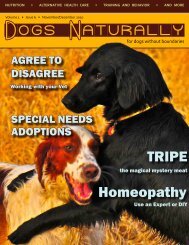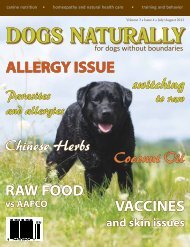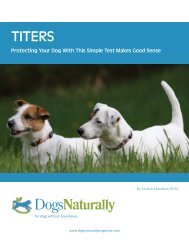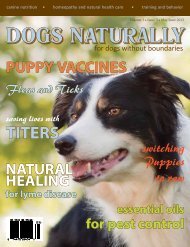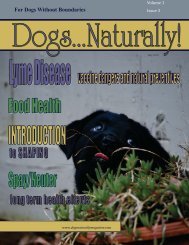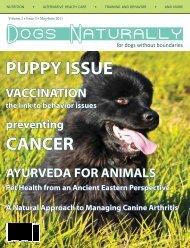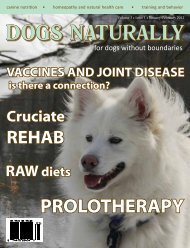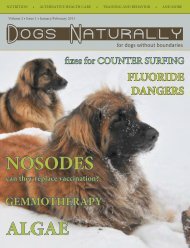For Dogs Without Boundaries - Dogs Naturally Magazine
For Dogs Without Boundaries - Dogs Naturally Magazine
For Dogs Without Boundaries - Dogs Naturally Magazine
Create successful ePaper yourself
Turn your PDF publications into a flip-book with our unique Google optimized e-Paper software.
where cereal grain crops are grown on<br />
iodine-deficient soil will impair thyroid<br />
metabolism because this mineral is essential<br />
for formation of thyroid hormones.<br />
Recently an important link has been<br />
shown between selenium deficiency and<br />
hypothyroidism. Again, cereal grain<br />
crops grown on selenium-deficient soil<br />
will contain relatively low levels of selenium.<br />
While commercial pet food manufacturers<br />
compensate for variations in<br />
basal ingredients by adding vitamin and<br />
mineral supplements, it is difficult to<br />
determine optimum levels for so many<br />
different breeds of dogs having varying<br />
genetic backgrounds and metabolic<br />
needs. The selenium-thyroid connection<br />
has significant clinical relevance, because<br />
blood levels of total and free T4 rise with<br />
selenium deficiency. However, this effect<br />
does not get transmitted to the tissues<br />
as evidenced by the fact that blood levels<br />
of the regulatory thyroid stimulating<br />
hormone (TSH) are also elevated or unchanged.<br />
Thus, selenium-deficient individuals<br />
showing clinical signs of hypothyroidism<br />
could be overlooked on the basis<br />
that blood levels of T4 hormones appeared<br />
normal. The selenium issue is<br />
further complicated because chemical<br />
antioxidants can impair the bioavailability<br />
of vitamin A, vitamin E and selenium<br />
and alter cellular metabolism by inducing<br />
or lowering cytochrome p-450, glutathione<br />
peroxidase (a seleniumdependent<br />
enzyme), and prostaglandin<br />
levels. As manufacturers of many premium<br />
pet foods began adding the synthetic<br />
antioxidant, ethoxyquin, in the late<br />
1980's, its effects along with those of<br />
other chemical preservatives (BHA. BHT),<br />
are surely detrimental over the long<br />
term. The way to avoid this problem is to<br />
use foods preserved with natural antioxidants<br />
such as vitamin E and vitamin C.<br />
Immunological Effects of Vaccines<br />
Combining viral antigens, especially<br />
those of modified live virus (MLV) type<br />
which multiply in the host, elicits a<br />
stronger antigenic challenge to the animal.<br />
This is often viewed as desirable<br />
because a more potent immunogen presumably<br />
mounts a more effective and<br />
sustained immune response. However,<br />
it can also overwhelm the immunocompromised<br />
or even a healthy host that is<br />
continually bombarded with other environmental<br />
stimuli and has a genetic predisposition<br />
that promotes adverse response<br />
to viral challenge. This scenario<br />
may have a significant effect on the recently<br />
weaned young puppy that is<br />
placed in a new environment.<br />
Furthermore, while the frequency of<br />
vaccinations is usually spaced 2-3 weeks<br />
span, some veterinarians have advocated<br />
vaccination once a week in stressful<br />
situations. To me, this practice<br />
makes no sense from a scientific or medical<br />
perspective. While young puppies<br />
exposed this frequently to vaccine antigens<br />
may not demonstrate overt adverse<br />
www.dogsnaturallymagazine.com January/February 2010 | 39




